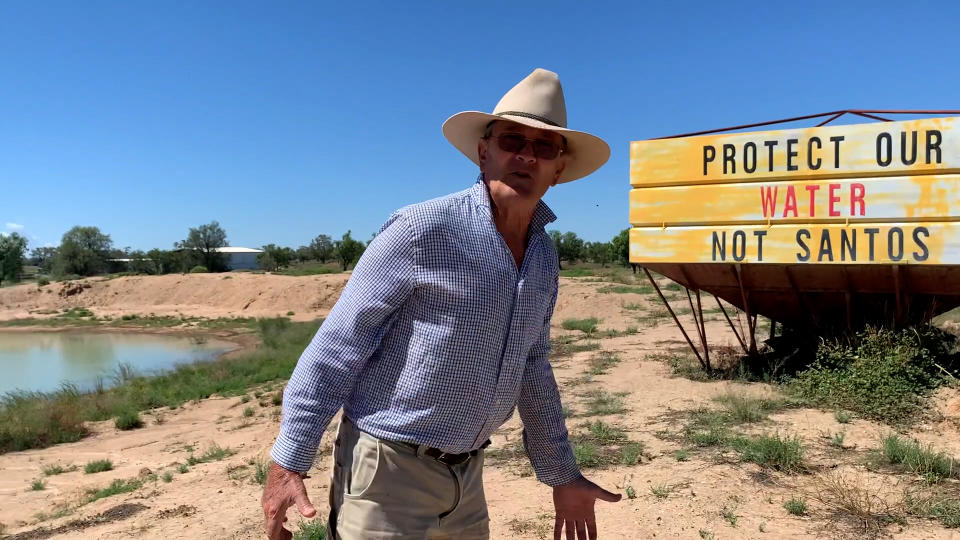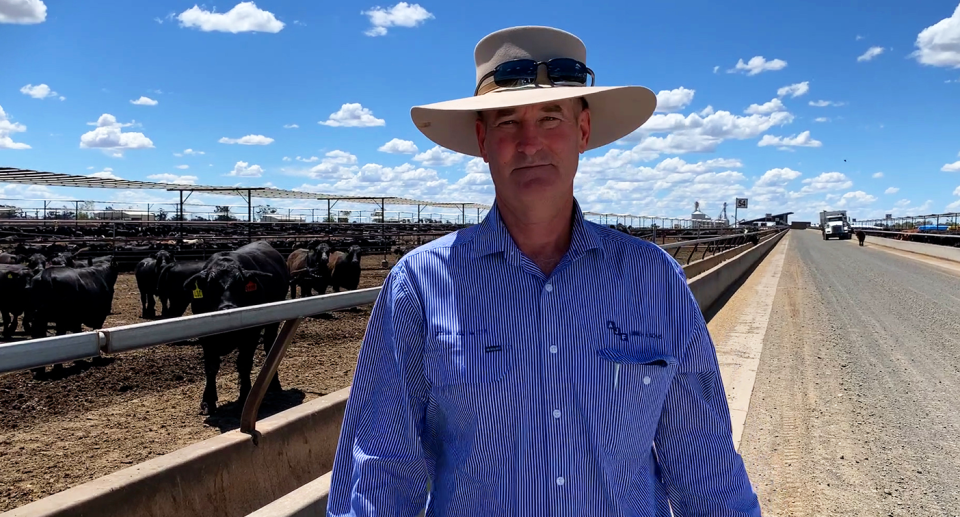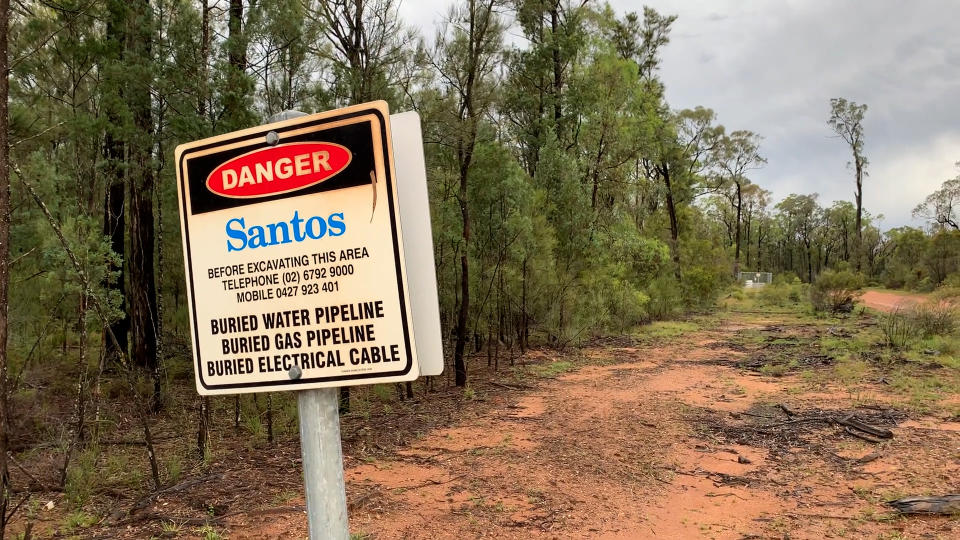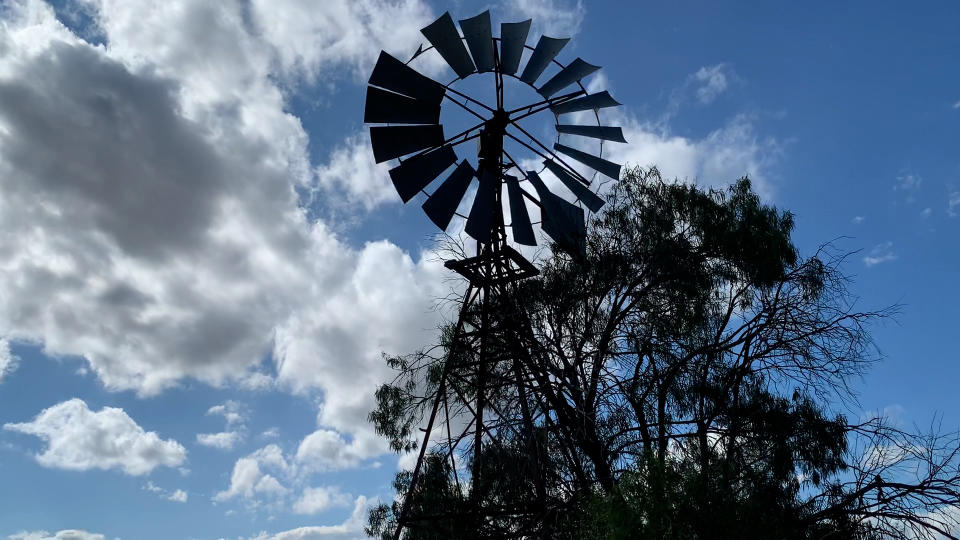Farmers fear 'there will be blood spilt' as bitter battle heats up
This is the first of a four part series, reporting on the community impact of the controversial Narrabri gas project.
Farmers fear blood will be spilt as they stand firm in defence of their land, opposing a NSW government backed coal seam gas project.
Many of those living close to the proposed Narrabri gas project, 452km north-west of Sydney, say they may have no choice but to put their bodies on the line to protect the region’s agriculture.
At stake, the men argue, is the future of Australia’s farms.

Having survived 10 years of drought, the importance of having underground water supply has never been more clear to farmers, and many believe the $3.6 billion project risks polluting their bores, despite assurances from Santos to the contrary.
Bright yellow signs bearing slogans like ‘Lock the Gate’ and ‘Farms not Coal seam gas’ are affixed to fence lines and gates around the region, from Gunnedah to Coonabarabran, Pilliga to Narrabri.
Standing shaded by a large cowboy hat, Coonamble farmer Don McKenzie says he and his mates have a “fight on (their) hands”.
“I think before this is all finished there will be blood spilt,” he said.
“And it’ll be on the hands of the government, because they know how we feel and they know what’s going on out here.
“We’ve been letting them know and they’ve paid no notice.”
Farmer ready to fight coal seam gas industry
The farmers’ struggle to stop the gas drilling has been running as long as the drought itself.
As early as 2012, card carrying National Party voting farmers did the unthinkable and began speaking with “dreadlocked activists” to delay work on the project.
Mr McKenzie, a self-described “newcomer” to the movement, recalls physically locking himself onto Santos’ gates when they began constructing the Leewood waste water site in 2016.

“It was very daunting to say the least, for someone my age who had never done anything like that in my life,” the now 69-year-old recalled.
“I sat in front of the double gates, wired to the joint, with a big collar around my neck joined to the gates.
“I sat there for the day and shut production down.”
The actions of Mr McKenzie and other protesting farmers garnered international attention, and little work has gone ahead since, with the project stalled by planning approvals.
Of 23,000 submissions lodged in response to Santos’ environment statement, 98 per cent voiced opposition to the project.
Despite opposition from NSW Labor and the Shooters, Fishers and Farmers Party, the plan has been backed by the state government, and was subsequently approved by the Independent Planning Commission (IPC) in September, with 134 conditions attached.
Part 1: Farmers fear 'there will be blood spilt' as coal seam gas battle heats up
Part 2: Gas project will destroy sacred site, Indigenous elders fear
Part 4: Concern for wildlife after contentious plan approved
The Commonwealth Government is yet to give the project its environmental rubber stamp, but with Prime Minister Scott Morrison striking a $2 billion gas-fuelled energy deal with NSW, and pinning the country’s Covid-19 recession recovery on the industry, observers believe Narrabri is unlikely to face many federal hurdles.
Farmer outraged by attacks ‘from inside our borders’
Three years on from the last “lock on” protests, the legal landscape has changed, with increased penalties enacted to dissuade activists protesting on private land.
The laws, named the Right to Farm Act, were introduced by the NSW Government in 2019, and touted as a way to protect farmers from “vegan vigilantes”.
Welcomed by some landholders as a way to enforce property rights, Coonamble feedlot operator, David Chadwick, alleges the laws are actually more likely to be used against farmers.

The Act not only increased penalties for unlawful entry and disruption onto farms, but applies generally to “inclosed lands”, which Mr Chadwick notes could mean mining or drilling sites.
Trespassing that hinders business is now punishable by a three year jail term, and fines have been increased from $5500 to $22,000.
“[The government] brought the legislation in under the premise that if an activist locked onto a tractor, the farmers would be protected, but that’s a load hogwash,” Mr Chadwick argues.
“It’s designed to stop farmers locking onto mining equipment, because the farmers cannot cope with losing their water.
“I’ve never heard of an activist locking onto a tractor in my life, I’ve only been around for 57 years... but I’ve heard of plenty of people locking onto mining equipment.”

Regardless of the increased penalties Mr McKenzie is resolute that he will find a way to stop the project, saying he has a duty to protect his community.
“I had my grandfather and four uncles all go off to the First World War and the Second World War, fighting to protect their land and their water, and their way of life," he said.
“Now today we're being attacked from inside our borders and it’s being allowed to be done by our government.”
Santos say they guarantee no contamination of water
Santos’ plan is to drill through sandstone to reach coal seams across 95,000 hectares of the Pilliga State Forest and adjoining farmland around Narrabri, creating 850 gas wells over 20 years.
The company’s engineers will penetrate the shallow aquifers used by farmers, and install steel and concrete pipes 500 to 1,200m below the surface.

Estimates suggest 37.5 billion litres of saline water will be used during the project’s lifetime, sucked from beneath an area housing a recharge zone of Australia’s largest clean underground water source - the Great Artesian Basin.
While the government says the project will secure gas supply in NSW for 20 years and create much needed jobs in the district, many farmers fear the drilling risks irreversibly contaminating clean water supplies.
Despite the farmer’s concerns, Santos say their research shows the majority of people in surrounding areas actually support the project and that their operations will comply with the law.
'Friends not talking': Controversial decision dividing Aussie town
The surprising list of animals hiding in our cities which face extinction
'Glorious sight': Drought-stricken farmer's remarkable before and after photos
In a statement provided to Yahoo News Australia by a Santos spokesperson said they can guarantee there will never be leakage into ground water or river systems.
“The integrity of the bores will be maintained over time, until they are safely and permanently decommissioned,” they said.
During flood events the company noted they have approval to discharge treated water into Bohena Creek and use it for irrigation.
Santos’ wells will be made of concrete and steel, but nevertheless there are farmers who remain concerned that the structures will eventually fail.
Many locals are still haunted by the 2011 untreated saline water leak at the Bibblewindi treatment plant, which went unreported by the project’s predecessor Eastern Star Gas (ESG), of which Santos owned a 20 per cent share.
Santos was fined $52,000 for ESG’s spill, with the judge commending their efforts to report it after acquiring the project.
The site remains denuded despite regeneration efforts, although Santos maintains the area is no different to the rest of the drought affected landscape.
Narrabri project a ‘Trojan horse’ warn opponents
The Narrabri gas project has been described as a “Trojan horse” by coal seam gas opponents Lock The Gate Alliance, with many fearing it is the beginning of the “gasification” of western NSW.
A spokesperson from the grassroots charity, Margaret Fleck, noted that since the IPC decision, other resource companies have indicated an intent to reactivate expired exploration licenses.
One of those signalling that resolve is Comet Ridge who said it “anticipates a return to exploration and approval” of its dormant licences.
Australia’s largest pipeline builder APA has also welcomed the Narrabri project’s approval, saying in a statement that it will look to progress its 460km Western Slopes Pipeline (WSP) through the Pilliga region.
“APA looks forward to continuing our long and successful record of working with communities in NSW to deliver major infrastructure projects,” they said.
“The WSP is a significant investment that will not only bolster energy security but support economic recovery and provide jobs at this critical time."

The pipeline could open up more land to gas drilling along its route, meaning more jobs and growth, but unsettling those farmers who do not want to see drilling on their land.
Farmer activist insists opponents aren’t ‘ratbag lunatics’
Farmer Don McKenzie believes many of those in government unfairly characterise opponents of the gas project like him as “ratbag lunatics”.
Despite being ready to take on the industry once more, he says he does not enjoy conflict and prefers a quiet life.
“All we are wanting to do is protect our land and our water and our livelihoods,” he said.
“It’s as simple as that. It's very, very simple what we’re trying to do.
“I’m old. This is not going to affect me.
“It's going to affect my children and my grandchildren, they're the ones who are going to have to pay for this mistake that's being made now.
“And that's what we are trying to prevent.”
Do you have a story tip? Email: newsroomau@yahoonews.com.
You can also follow us on Facebook, Instagram and Twitter and download the Yahoo News app from the App Store or Google Play.



